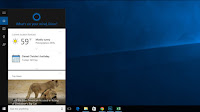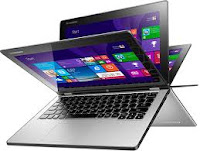Now that Windows 10 is out and so many
people have been asking, here is my review and some shortcuts tips on the
new Operating System. After being a beta tester with Microsoft for the
last year or so, the best thing I can say is that it is not Windows 8!
The OS
itself has been smooth and reliable. None of the apps or programs I have
crashed on me, or caused a "not responding" error. The boot up
time is fast... though that's because the logon screen pops up as the system is
still booting.
With Windows 10, Microsoft has transitioned Internet
Explorer out and introduced Edge Browser. I must say, I am a big Chrome
fan and love the ecosystem the browser provide around my android and other
google apps, but I must say that Browser is very fast and effective. And
not as heavy on the memory like google chrome. Its a simple Browser that just
works.
 Like Android with Google Now or Apple with Siri,
Windows 10 introduce its own version of a virtual assistance software
called Cortana. What is different from MS version from Apple and Google
is that a virtual assistance has come to the desktop. Haven't really played too
much with it, but I can tell it will be very helpful for the everyday home
user.
Like Android with Google Now or Apple with Siri,
Windows 10 introduce its own version of a virtual assistance software
called Cortana. What is different from MS version from Apple and Google
is that a virtual assistance has come to the desktop. Haven't really played too
much with it, but I can tell it will be very helpful for the everyday home
user. I think
Windows 10 will start a new trend for home user. Instead of just buying a
typical tablet, people will start buying a 2 in 1 laptop machine. A
laptop that can convert from a laptop mode to a tablet mode with a flip of the
screen. Windows 10 is the perfect OS to run this type of hardware as it
can detect what mode you are in and the user interface can change
accordingly.
I think
Windows 10 will start a new trend for home user. Instead of just buying a
typical tablet, people will start buying a 2 in 1 laptop machine. A
laptop that can convert from a laptop mode to a tablet mode with a flip of the
screen. Windows 10 is the perfect OS to run this type of hardware as it
can detect what mode you are in and the user interface can change
accordingly.
Also
below are a handful of new shortcuts that you will
find useful to help you navigate around the interface... get apps in position, trigger events,
change settings and more with a couple of taps on your keyboard.
Window
snapping has changed slightly in Windows 10 and so have the shortcuts. App
windows can be snapped to either side of the screen, as in Windows 8, but you
can also assign them to quadrants and get four windows open on screen
simultaneously.
Windows Key+Right — snap active window to the right.
Windows Key+Up — snap the active window to the top.
Windows Key+Down — snap the active window to the bottom.
Bonus:
Whenever you snap a window to a side or a quadrant, Windows will automatically
suggest you pick one of your open apps to fill the remaining real estate on
your desktop.
Official
support for virtual desktops is one of the most exciting new additions in
Windows 10. It’s kind of like having extra invisible monitors. Each
desktop can have its own set of apps but shortcuts and wallpaper are consistent
across the board.
Windows Key+Ctrl+D — create a new
virtual desktop.
Windows Key+Ctrl+Left — scroll through your desktops to the left.
Windows Key+Ctrl+Right — scroll through your desktops to the
right.
Windows Key+Ctrl+F4 — close the current desktop.
Windows Key+Tab — see all your desktops (and open
apps!) via the Task View page.
If
you don’t feel entirely comfortable shouting out “hey Cortana!” across a
crowded room, then there are keyboard shortcuts that can help—once Cortana is
active, you can choice voice or keyboard input.
Windows Key+S — open up Cortana ready for typed input.
Windows Key+I — open up the Windows 10 settings pane.
Windows Key+A — open up Windows 10 notifications (Action
Center).
Windows Key+X — open the Start button context menu (the
one with easy access to a host of common computer management features—like the
Command Prompt below).
Besides
all the new Windows 10 keyboard shortcuts, there are plenty of old classics
that have survived successive versions of the operating system and are still
going strong. Here are the combinations you’re going to need to navigate around
the interface.
Windows Key+, — temporarily hide apps to briefly show the
desktop.
Windows Key+D — minimize apps to go straight to the
desktop.
Ctrl+Shift+M — restore all minimized windows to full-size
(useful after a Win + D)
Windows Key+Home — minimize all windows except the one
you’re actively using
Windows Key+L — lock your PC and go to the lock screen.
Windows Key+E — launch File Explorer (aka Windows
Explorer).
Alt+Up — go up one level in File Explorer.
Alt+Left — go to the previous folder in File Explorer.
Alt+Right — go to the next folder in File Explorer.
Alt+Tab — switch between windows. (Hold down Alt
while tapping Tab to pick visually).
Alt+F4 — close the current window.
Windows Key+Shift+Left (or Right) — move
a window to your next monitor.
Windows Key+T — cycle through taskbar items (hit Enter to
launch).
Windows Key+Any Number Key — open the app pinned to the taskbar
in the numbered position (e.g. Win+2 launches the app in your
second taskbar slot)
Ctrl+Shift+Esc — open the Windows 10 Task Manager.
Windows Key+R — open the Run dialog box.
Shift+Delete — delete files without sending them to the
Recycle Bin.
Alt+Enter — show the properties of the currently selected file.
Windows Key+U — open the Ease of Access Center.
Windows Key+Space — switch input language and keyboard.
Windows Key+Shift+Any Number Key — launch a new
instance of the app in the numbered taskbar slot
Windows Key+Ctrl+Shift+Any Number Key — same, but launch the
app with admin powers enabled
Windows Key+PrtScr — take a screenshot saved to your Pictures
folder.
Windows Key+G — open the Game DVR recorder (if supported
by your graphics card).
Windows Key+Alt+G — start recording activity in the current
window.
Windows Key+Alt+R — stop recording in the Game DVR.
Windows Key+P — switch between display modes (with a
secondary display connected).
Windows Key+plus — zoom in using the Magnifier utility.
Windows Key+minus — zoom out using the Magnifier utility.
Find
even more list of shortcuts at the Microsoft site: Click Here
And the
greatest feature about Windows 10.. is that its FREE for windows 7 / 8 users
(Home Edition).






No comments:
Post a Comment